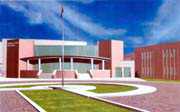Although expansion plans at the middle school/high school complex have not yet received all their state approvals, school officials will move ahead in seeking bids for phases of the project slated to begin this summer.
In a report issued by architects Faridy, Veisz, and Fraytak at the May 6 board of meeting, John Osborn, representing the firm, said aspects of the project would be put out to bid this week.
“We expect to receive bids on June 3 with work to begin a few weeks after that,” he said.
Last September, Secaucus voters approved a $14 million bond for the expansion of the middle school/high school complex, which included some roof and window replacements for both elementary schools and a new boiler for Clarendon School.
Osborn said the school district has already received approval from the state Department of Community Affairs and the Department of Education for roof replacement for a small portion of Clarendon School and the entire roof (except for the recent expansion) at Huber Street School.
The middle school/high school roof will also be repaired this summer, although this is a much more substantial project because the existing roof has caused some damage to the building’s structure and sections of the structure will have to be replaced.
Bidding on the new boiler for Clarendon School will also take place, even though the district has not yet received final approval from the state’s Department of Community Affairs.
The DCA’s local finance office monitors purchases that come out of municipal bonds to make sure they meet state laws.
Osborn said the project could be changed later to meet any DCA recommendations if necessary.
Window replacement on both elementary schools can move ahead without state approval, he said.
At the middle school high school, the former auto and wood shops will be converted to classrooms this summer, while a majority of expansion work such as the construction of the school auditorium, the kitchen upgrade and the construction of the science labs will take place later.
Osborn said his firm will try go push the DCA for approvals for the workshop conversion so that it can be begun this summer. “This will include knocking down some walls,” he said.
The bulk of the project, however, will begin later.
“Heavy construction will start in the fall,” said Brian Meade, one of the principle partners of the firm, and the project coordinator.
This means the construction of the auditorium will start after school opens in September. The science labs and kitchen will be done over the summer of 2004, with the project expected to be completed for opening day, 2004.
Although work to upgrade and expand the tennis courts will likely take place this summer, work on the track and football field will take more time. Sports programs that used these facilities will have to be relocated to Kane Stadium until 2004.
Meade said the project will call for a tremendous amount of coordination with the school, especially in detailing where students and teachers can enter and exit the school during construction.
“I met with town officials to discuss fire safety and other issues,” Meade said. “I also spent two days on site during the spring break to look things over.”
Board hires PMK to probe contamination
After an extensive closed door session, members of the school board agreed to hire the PMK Group, environmental engineers, to further probe the extent of oil or other contamination at the high school complex for a fee of $57,000.
The vote was 8 to 1, with Board member Tom Troyer voting against.
The oil contamination was discovered during a routine test of the grounds near the high school in March as part of preliminary studies for the construction of the new auditorium.
Because the contamination in one area exceeded cleanup standards set by the state Department of Environmental Protection, the school board must do additional studies to determine the full extent of the contamination.
Eric Meyer, of PMK, said that while he believed the contamination not to be extensive, the DEP requires certain testing to be done. Options for cleanup vary, depending on what PMK finds. Contaminated water can be pumped out, soil removed or capped, and the testing itself could be limited provided currently proposed tests determine that the exact area contaminated is limited.
The contract, however, does not cover the cost of cleanup or treatment of the area.
Committee assignments set
In one of his first acts as the new Board of Education president, Michael Schlemm issued committee assignments before the May 6 meeting.
School Government Committee – Eleanore Reinl, chair, George Heflich, Tom Troyer.
Buildings and Grounds Committee, Anthony Rinaldi, chair, Maura DeGennaro, William Millivoi.
Technology Committee, Schlemm, Chair, Rinaldi.
Finance Committee, Angelo Andriani, chair, Heflich, Troyer.
Negotiations Committee, Schlemm, chair, Heflich.
Shared Services Committee, Millevoi, chair, Andriani, DeGennaro.
Policy, Troyer, chair, Reinl, Pirro.
Adult School Liaison, Pirro.
Athletic/Band Liaison, DeGennaro,
Huber Street School Liaisons, Troyer, Heflich.
Clarendon School Liaisons, Reinl, Rinaldi.
Middle School Liaisons, Andriani, DeGennaro.
High School Liaisons, Pirro, Millevoi.
